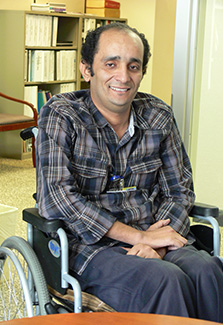Reducing injuries in Egypt
May / June 2022 | Volume 21 Number 3
 Photo courtesy of Egypt Ministry of HealthMohamed Seif El-din, MB.BCh, MPH
Photo courtesy of Egypt Ministry of HealthMohamed Seif El-din, MB.BCh, MPH
Mohamed Seif El-din is the Director of Poison Control and Burn Care Administration and Vice Head of the Central Administration of Critical and Urgent Care of Egypt’s Ministry of Health. Following medical training at Ain Shams University, he received certification in research methods for guideline policy development and a master's in public health. He's served as a representative for the European Union Twinning project on road safety, a member of the National Road Safety Council, and Egypt’s lead representative to the WHO’s road safety projects. He is currently pursuing a doctorate in public health.
Q & A with Mohamed Seif El-din
What inspired your interest in research?
My first work experience after graduation was as a health officer in the Cairo ambulance service. I observed that calls about injuries were more frequent than any other emergency. Yet there were no studies conducted around this valuable data. I wrote a proposal to develop a database information evaluation system for road traffic injuries and the American University in Cairo awarded me a budget. Later, my masters’ thesis was based on data collected from the system I’d created.
Eventually, I was promoted to Director of the Information and Decision Support Center in the Critical Care and Urgent Department in the Ministry of Health. One of my accomplishments was a systematic review of different types of injuries at the national level. The outcomes of this research formed the basis of Egypt's national ambulance reform plan. My interest in injury prevention research is sustained by the many opportunities for collaboration with academia, local and international government agencies, NGOs, and nonprofit organizations. In addition, my research has helped me gain skills across many disciplines, including psychology, engineering, and urban planning.
Tell us about your experience as a Fogarty trainee.
Fogarty selected my application to participate in a two-month training program to enhance my injury epidemiological knowledge, skills, and experience. The program strengthened my ability to write proposals including how to pose research questions, formulate hypotheses, construct methodologies, gather reliable data, and analyze outcomes.
Through Fogarty, I worked with colleagues from different specialties. This cross-discipline collaboration allows you to learn from others, including how to critique them. This had a strong impact on my published work, which was based on what I learned from this experience. I developed an appetite for acquiring knowledge in fields parallel to my own research. For example, I now have a diploma in advanced hospital management, which enables me to translate scientific evidence and outcomes into action plans.
My program mentors didn’t spare any effort when offering help during or after the course… and always with a friendly attitude! Because of Fogarty, I finalized my doctorate dissertation and published three independent scientific papers, and this led to steady progress at the Ministry of Health.
You use a wheelchair: Did that impact your career?
When I was 14 years old, I was diving in a shallow pool, and I injured my spinal cord. This crippled me but it hasn’t crippled my career or motivation. I also would not say my health condition influenced my career path or affected my position. After all, I have many responsibilities, more than most people with better locomotion have. Career is based on motivation and the encouragement you receive from your family and your coworkers.
Why study injury epidemiology?
Injury epidemiology helps me integrate the research of different specialties within my three administrative areas: road traffic injuries, burn injuries, and poison toxicology. For example, I’ve explored the links between drug abuse/addiction and traumatic brain injury severity prognostic assessment. That said, road traffic injuries are the primary injury issue in Egypt—and across the globe. Road traffic collisions cause health, social, and economic effects that outweigh even war and conflicts. Globally, 1.5 million out of 5 million reported injury deaths are road traffic related. Effective road safety interventions require: Integration between different stakeholders; coordinated collaboration; and evaluation of context — there is no one size fits all. Local context matters.
Tell us about your current role at the Ministry of Health.
As a director and vice head, I manage the central administration of all urgent and critical care. I oversee information systems and conduct research for road traffic injuries, poison control, and burn care. So I wear multiple hats, yet all my work relates to reducing injuries.
As a member of the National Road Safety Council in Egypt, I interact with different stakeholders, including the ministries of education, interior, environment, and infrastructure, to decrease the burden of road traffic injuries. I also lead the ministry of health partnership team in an international collaboration among four Egyptian universities and three European universities: Malta University, University of New Castle, and Sweden Royal Institute of Technology. This project developed an IT diploma and a professional certificate in clinical toxicology, which is currently lacking in Egypt. In ways this is similar to a previous EU project I participated in where we constructed a uniform GPS-coordinated accident registration system in Egypt. As a result, we can now share safety and post-crash investigation to come up with reliable safety recommendations for decision making.
More Information
Updated June 15, 2022
To view Adobe PDF files,
download current, free accessible plug-ins from Adobe's website.
Related Fogarty Programs
Related World Regions / Countries
Related Global Health Research Topics